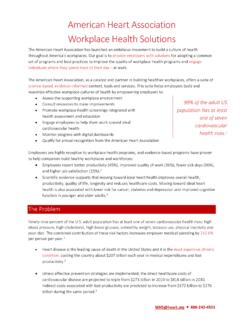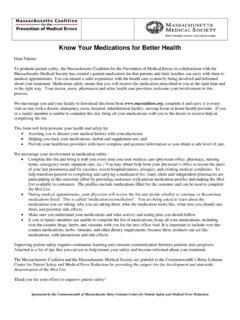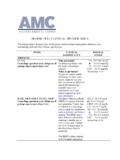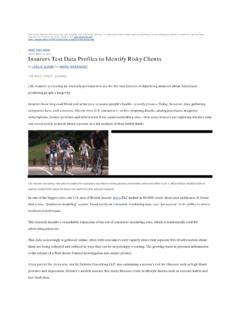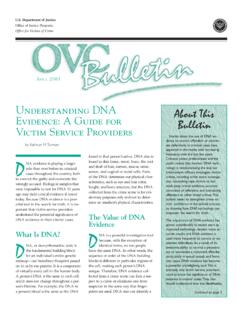Transcription of SCENARIOS AND RESPONSES - CRG
1 FORENSIC DNA COLLECTION: A CITIZEN'S GUIDE TO your RIGHTS. SCENARIOS AND RESPONSES . 1. DNA Dragnets Scenario You are between the ages of 18 and 35 and live in a city, town or neighborhood where a homicide has occurred. A police officer comes to your home and requests a cheek swab of your saliva so that a DNA. profile can be obtained. You are told that the purpose of obtaining your DNA is to exclude you as a suspect. This is what is known as a DNA dragnet to find the perpetrator of a crime. You are told that you have the right to refuse but if you do, the police will treat you as a potential suspect. You are not told anything about what will happen to your DNA profile and the biological sample from which it is drawn after the case is closed.
2 Legal Rights and RESPONSES You have the right to refuse to allow police to conduct a cheek swab. It is legal for police to ask for a voluntary DNA sample but they must be careful about how they phrase the request. A Fourth Amendment violation can occur if police mislead an individual; for example, by saying he or she has a duty to provide a sample or saying that the person will be treated as a suspect for refusing. The courts have repeatedly determined that the taking of DNA constitutes a search under the Fourth Amendment. It is also improper for police to threaten to report names to the press of those refusing to provide a sample. DNA dragnets are not always truly voluntary and may feel extremely coercive.
3 People are often afraid to say no to police out of fear that their refusal may cast suspicion on them. But you have the right to say no and you should exercise that right. If you agree to provide a DNA sample, you should assume the police will keep it forever and will include your profile in the offender database. Because you have given the sample voluntarily, you may not be eligible for your state's procedure to have the sample expunged. If you have any concerns about giving a sample voluntarily, you should tell the police that you wish to talk with a lawyer about the consequences of providing a sample before you decide whether to give one. Although the police may be suspicious of your refusal, they cannot obtain a warrant based only on that refusal.
4 BOARD OF DIRECTORS Sheldon Krimsky, PhD, President Tania Simoncelli, Vice Chair Peter Shorett, Treasurer George Annas, JD, MPH Evan Balaban, PhD Paul Billings, MD, PhD. Sujatha Byravan, Rayna Rapp, PhD Lola Vollen, MD, MPH. While law enforcement officials may promise to destroy samples after testing, there is no way to determine if the evidence has in fact been destroyed. After a DNA dragnet of over 1,000 men in Louisiana failed to find a match to the suspect's genetic profile, law enforcement officers entered the local men's DNA profiles into the state's criminal database. Some individuals have sued, usually without success, to have their DNA profiles removed and biological samples destroyed.
5 2. Arrestee DNA Collection Scenario You are arrested and detained but not charged or convicted of any crime. Can the police obtain a profile of your DNA? Can they upload the profile to the national forensic DNA database, CODIS (Combined DNA Index System), operated by the FBI? Are you obligated to give the police a biological sample (blood or saliva)? Legal Rights and RESPONSES If federal agents detain and arrest you, they have the authority to take DNA from you and to immediately upload it to CODIS. If local authorities arrest you, depending on the laws in your state, you may be obligated to give a DNA sample. The DNA Fingerprint Act of 2005 allows states to upload profiles to CODIS.
6 Eleven states (Alaska, Arizona, California, Kansas, Louisiana, Minnesota, New Mexico, North Dakota, Tennessee, Texas and Virginia) currently allow for involuntary DNA collection from individuals merely arrested or suspected of a crime. You should familiarize yourself with the laws in your state and if they do not provide for involuntary collection, you should consult with an attorney before submitting to a DNA test. Usually the police need a search warrant to collect your DNA unless you have been convicted of a crime. Under federal law, the government requires people arrested for certain crimes to provide DNA. samples. These laws probably violate the Fourth Amendment to the Constitution which guarantees the right of the people to be secure in their persons, houses, papers, and effects against unreasonable searches and seizures.
7 The conduct of a search generally requires probable cause and a judicial warrant, or at least individualized suspicion. However, the courts have yet to decide this question. If the police want to take a sample of your DNA, you should make it clear that you are not voluntarily providing a sample, recognizing that they may take it anyway. In April 2008, the Department of Justice proposed a rule for compelled DNA sample collection from arrestees and detainees under the DNA Fingerprint Act of 2005 and the Adam Walsh Child Protection and Safety Act of 2006. The rule directs federal agencies that arrest or detain individuals to obtain DNA samples if the agency also takes fingerprints from such persons and specifies procedures for collection.
8 The rule does not indicate whether an arrestee/detainee will be advised of their right to legal counsel before a DNA sample is taken, nor does it provide for an appropriate period of delay to accommodate judicial review if counsel for the arrestee wishes to seek a determination by a court of the legality of the DNA sample collection before it occurs. Substantial questions surround the constitutionality of compelled DNA seizures from people who have not been convicted of crimes and the issue has yet to be definitively determined by the courts. In addition, the rule proposes to sanction the use of physical force and compulsion against unconvicted and presumably innocent individuals.
9 Finally, the rule allows federal agencies to contract with private entities to carry out the collection of DNA samples. 3. Familial Searching of DNA. Scenario A detective visits your home and explains that the DNA profile of a second cousin of yours was a close, but not identical, match with the DNA profile obtained from biological evidence left at a crime scene. The detective explains that the perpetrator of the crime is very likely a member of your family and s/he would like to ask you questions about your family. In addition, the detective requests a cheek saliva swab from you so that you can be eliminated as a suspect in this crime. Legal Rights and RESPONSES You do not have to talk to the police or let them into your home.
10 You can tell them that you want to consult with an attorney before deciding whether to speak with them (and then do so). You can also tell them that you simply do not wish to talk to the police at all, as is your right under the Fifth Amendment against self-incrimination. You do not need to provide a DNA sample unless they have a search warrant that requires it. In 2006, laws that limited familial searching were loosened and police are increasingly engaging in familial or low stringency DNA searches. DNA profiles in government forensic DNA databases are used to identify parents, children, siblings and relatives whose profiles are not in the databases, thus the term familial searching.
